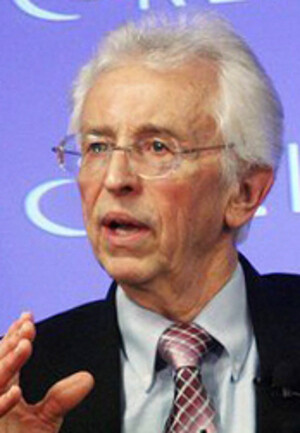hankyoreh
Links to other country sites 다른 나라 사이트 링크
Experts observe development in North Korea’s nuclear program

By Park Hyun, Washington correspondent
Leading North Korea experts in the US are warning that the country’s nuclear capabilities are becoming more sophisticated, and it is looking less likely that Pyongyang will give up its nuclear program.
Siegfried Hecker, a renowned nuclear researcher at Stanford University, wrote in an article for the Bulletin of the Atomic Scientists that North Korea was likely to “operate the restarted 5-megawatt reactor [at Yongbyon] for two years with a full load of 8,000 fuel rods, cool this spent fuel and extract roughly 10 to 12 kilograms of plutonium within three years.”
According to Hecker, this means North Korea would be able to produce roughly one nuclear weapon per year.
“Such a production rate does not constitute a game changer, but it would give North Korea more plutonium to test in order to refine its nuclear devices to fit on its missiles,” he wrote.
Hecker also said North Korea could repurpose its experimental light water reactor (ELWR) from electricity production to produce 10 to 15 kilograms of weapons-grade plutonium a year.
“A more troublesome alternative . . . would be if Pyongyang built a copy of the 50-megawatt reactor that was near completion in 1994, but then abandoned because of the Agreed Framework [in 1994],” he wrote.
He added that this project would “take at least five years to complete.”
“The 10 bombs’ worth of plutonium this reactor could produce would be a game changer,” he warned.
Noting that North Korea was “moving ahead on all nuclear fronts,” Hecker observed, “Denuclearization of the Korean peninsula must remain the goal, but it is a more distant one following these new developments.”
“It will now be more challenging and costly, although not impossible, to get North Korea to agree to what I have called ‘the three no’s’ -- no more bombs (meaning no more plutonium and HEU); no better bombs (no nuclear testing and no missile launches); and no exports,” he continued.
Meanwhile, former US Assistant Secretary of State for East Asian and Pacific Affairs Evans Revere wrote in a report published by the Brookings Institute on Oct. 19 that many proponents of dialogue with Pyongyang have concluded that North Korea has no intention of giving up its nuclear or missile programs.
“China hopes to reconvene the Six-Party denuclearization talks that collapsed in 2008. Experience tells us that such negotiations, if they were to resume, will not end Pyongyang’s determined pursuit of nuclear weapons,” he wrote.
Revere said the US should step up its sanctions to make Pyongyang realize that a nuclear program would rule out economic development and increase instability.
At the same time, he also said Washington should leave the door open for sincere dialogue to achieve denuclearization.
“We should also recognize that only direct dialogue with North Korea’s leaders has any chance of changing DPRK policy,” he wrote.
Please direct questions or comments to [english@hani.co.kr]

Editorial・opinion
![[Editorial] Yoon must halt procurement of SM-3 interceptor missiles [Editorial] Yoon must halt procurement of SM-3 interceptor missiles](https://flexible.img.hani.co.kr/flexible/normal/500/300/imgdb/child/2024/0501/17145495551605_1717145495195344.jpg) [Editorial] Yoon must halt procurement of SM-3 interceptor missiles
[Editorial] Yoon must halt procurement of SM-3 interceptor missiles![[Guest essay] Maybe Korea’s rapid population decline is an opportunity, not a crisis [Guest essay] Maybe Korea’s rapid population decline is an opportunity, not a crisis](https://flexible.img.hani.co.kr/flexible/normal/500/300/imgdb/original/2024/0430/9417144634983596.jpg) [Guest essay] Maybe Korea’s rapid population decline is an opportunity, not a crisis
[Guest essay] Maybe Korea’s rapid population decline is an opportunity, not a crisis- [Column] Can Yoon steer diplomacy with Russia, China back on track?
- [Column] Season 2 of special prosecutor probe may be coming to Korea soon
- [Column] Park Geun-hye déjà vu in Yoon Suk-yeol
- [Editorial] New weight of N. Korea’s nuclear threats makes dialogue all the more urgent
- [Guest essay] The real reason Korea’s new right wants to dub Rhee a founding father
- [Column] ‘Choson’: Is it time we start referring to N. Korea in its own terms?
- [Editorial] Japan’s rewriting of history with Korea has gone too far
- [Column] The president’s questionable capacity for dialogue
Most viewed articles
- 1Months and months of overdue wages are pushing migrant workers in Korea into debt
- 2At heart of West’s handwringing over Chinese ‘overcapacity,’ a battle to lead key future industries
- 3[Editorial] Yoon must halt procurement of SM-3 interceptor missiles
- 4Fruitless Yoon-Lee summit inflames partisan tensions in Korea
- 5Trump asks why US would defend Korea, hints at hiking Seoul’s defense cost burden
- 6Dermatology, plastic surgery drove record medical tourism to Korea in 2023
- 71 in 3 S. Korean security experts support nuclear armament, CSIS finds
- 8[Editorial] New weight of N. Korea’s nuclear threats makes dialogue all the more urgent
- 9South Korea officially an aged society just 17 years after becoming aging society
- 10[Column] For K-pop idols, is all love forbidden love?